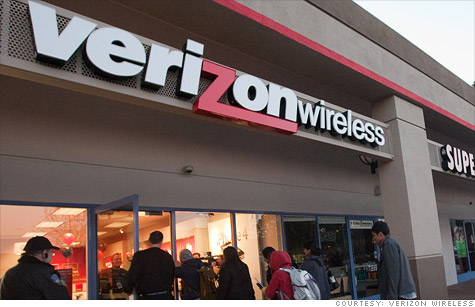Search News

NEW YORK (CNNMoney) -- Longing for an alternative to the U.S. wireless industry's Final Four? Don't hold your breath.
Comcast, the nation's largest cable provider, says it tire-kicked the market and couldn't make the numbers work.
"We could not find a viable business model to become the fifth national wireless competitor," said David Cohen, chief counsel to Comcast's CEO.
His remarks came Wednesday afternoon during a Senate antitrust subcommittee hearing on Verizon's proposed $3.6 billion wireless spectrum mega-deal. Under the blockbuster deal, announced in December, Comcast and several other cable companies would cede a sizable bundle of spectrum to Verizon (VZ, Fortune 500).
Wireless spectrum, the invisible infrastructure over which cellular communications take place, is a finite and much sought-after resource. As smartphone and tablet sales soar, wireless carriers are scrounging around for available airwaves.
The large chunk held by Comcast (CMCSA, Fortune 500), Time Warner Cable (TWC, Fortune 500) and Bright House Networks is one of the last remaining unused, nationally available swaths of spectrum on the market. It amounts to an average of 20 MHz of spectrum covering 259 million Americans -- more or less the amount of spectrum Verizon is currently using to deploy its new 4G network.
In exchange for selling the spectrum to Verizon, the cable company consortium would get the ability to sell Verizon's service to their customers on a wholesale basis. That would give them a "quad-play" option: TV, Internet, phone and wireless services all in one bundle.
The key question for regulators is whether Verizon's purchase would essentially eliminate a major competitor from the industry.
"This is the last swath of valuable spectrum that will be available for years to come," said Senate antitrust subcommittee chairman Herbert Kohl, a Democrat from Wisconsin, said at a hearing on the issue. "After winning the battle against AT&T (T, Fortune 500) and T-Mobile's merger, are we now about to lose the war?"
In response, lawyers for Verizon and Comcast emphasized the deal's necessity.
"It's critical that this spectrum gets put to use to expand the availability of mobile broadband," said Randal Milch, general counsel for Verizon. "It's no secret we're in a critical situation, as demand is growing."
Milch said Verizon services more customers per MHz of spectrum than any other company, and needs the additional spectrum to remain competitive.
Comcast came under attack by several senators for the seemingly damning words that Comcast Chief Financial Officer Michael Angelakis uttered in January at a Citigroup conference. Angelakis said: "We never really intended to build that spectrum."
The word "never" was "unfortunate," Cohen said, because Comcast "looked at deploying a wireless network as a viable option."
When it became clear that it wouldn't pay off, Comcast looked at virtually every available wireless partner before settling on Verizon, he said.
Verizon's rivals -- including T-Mobile, which strongly opposes the deal -- say the sale would dangerously consolidate power in the wireless industry with Verizon and AT&T, which are by far the largest two carriers in the United States.
Some compared it directly to the failed AT&T and T-Mobile merger, which regulators killed off late last year.
"The deal is elegantly contrived and superbly clever, but will deliver same insidious impact on wireless competition," said Steven Berry, CEO of the Rural Cellular Association. "The manipulation of spectrum resources is an effective tool in eliminating competition."
By book value, the Verizon-cable deal would actually be larger than the spectrum that would have been transferred in the AT&T/T-Mobile deal, according to Timothy Wu, a law professor at Columbia University. The deal would also be the single largest spectrum transfer that the Federal Communications Commission has ever considered.
"It is the equivalent of eliminating a competitor in marketplace," Berry said. "Telecom policy should not be relegated to the mantra of 'if you can't beat 'em join 'em.'" ![]()